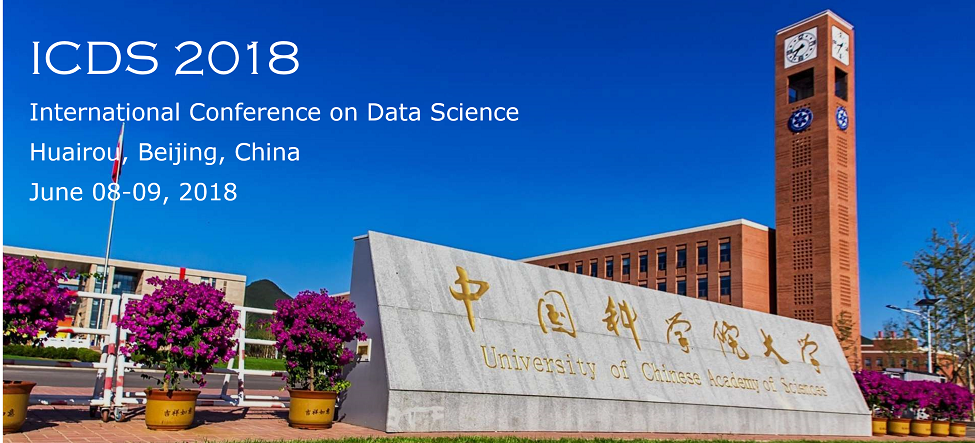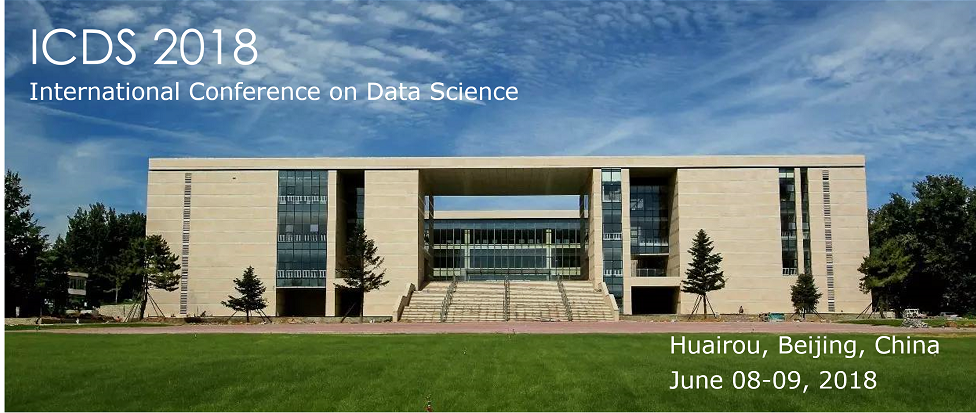ICDS 2018 – Beijing, China
"Advancement of Data Science and Big Data Applications"
The explosion of digital data created by mobile sensors, social media, surveillance, medical imaging, smart grids and the like—combined with new tools for analyzing it all—has brought us a Big Data era. We are facing the great challenges: how to deal with data which is more than we could actually understand and absorb and how to make efficient use of the huge volume of data? From both scientific and practical perspectives, research on "Data Science" goes beyond the contents of Big Data. Data Science can be generally regarded as an interdisciplinary field of using mathematics, statistics, databases, data mining, high-performance computing, knowledge management and virtualization to discover knowledge from data. It should have its own scientific contents, such as axioms, laws and rules, which are fundamentally important for experts in different fields to explore their own interests from data.
The "International symposium/workshop on Dataology and Data Science" has been a platform for researchers from data and some practitioners from industry and government to share their ideas, research results and experiences on studying of data. From 2010 to 2013, it has been annually held in China where more than 300 scholars and industrial professionals from Australia, Canada, China, Japan, UK and USA attended.
Started from 2014, this platform has been transferred as the annual International Conference on Data Science (ICDS) in order to further expand the preliminary findings and exchanges on Data Science. The last ICDS series were held at Beijing, China (ICDS 2014), Sydney, Australia (ICDS 2015), Xian, China (ICDS 2016) and Shanghai, China (ICDS 2017). ICDS 2018 will be held at Beijing, China in June 8-9, 2018. Its theme will be: "Advancement of Data Science and Big Data Applications". The main topics, but not limited to, are as follows:
- Mathematical Foundation Issues in Big Data
- Big Data Applications
- Big Data Applications
- Big Data Analytical Approach
- Case Study of Data-Intensive Scientific Research Paradigms
- Computational Foundation Issues in Big Data
- Data Mining on Network
- Data Quality, Data Visualization and Data Management
- Evaluation and Measurement between Data Objects
- Mathematical Issues in Data Science
- Scientific Data Analysis
- Social impacts by Data Science
We will invite well-known international scholars and professionals in various related fields, both natural and social sciences, to join us for the development of Data Science at this conference and so on to fully explore methodologies on Data Science from different research aspects.
KeyNote
In the era of big data, there are abundant of data available across many different data sources in various formats. “Broad Learning” is a new type of learning task, which focuses on fusing multiple large-scale information sources of diverse varieties together and carrying out synergistic data mining tasks across these fused sources in one unified analytic. Great challenges exist on “Broad Learning” for the effective fusion of relevant knowledge across different data sources, which depend upon not only the relatedness of these data sources, but also the target application problem. In this talk we examine how to fuse heterogeneous information to improve mining effectiveness over mobile applications.
With the rapid development of multi-platform, multi-sensor technologies, the multi-platform multi-sensor collaborative information acquisition system architecture has been developed and applied in the spatial information acquisition, and the demand for big data processing is also increasing. How to associate and fuse these data? How to get more valuable information from large-scale collaborative system? How to manage big data resources more effectively? We are given many scientific questions. In the face of current scientific issues in the acquisition and processing of big data, a preliminary analysis has been conducted. Hope these issues will be supported by the big data industry and further explored.
Prof. Jing Chen is an expert in communications and information systems. He is a doctoral supervisor in an institute. He has hosted a number of large-scale system engineering. Related technologies have been widely used in satellite ground applications such as resources, oceans, meteorology and earth observation. He has won the 1st Award of the National Prize for Progress in Science and Technology twice and the 2nd Award once. In 2005, he was elected as a member of the Chinese Academy of Engineering.
In computational science, the content of computation theory mainly includes computability, computational complexity, and algorithm design and analysis. This report only discusses the former two issues, and focuses on the computational complexity theory with big data: it mainly includes computation models and computation theories; the computation of P problem and parallel NC problem; the computation of NP problem and its interactive IP problem. Finally, in the conclusion, we present the inclusion relations of various complex problems and the research countermeasures for P and NP problems in the case of big data.
Guoliang Chen is Academician of Chinese Academy of Sciences and is Professor of Nanjing University of Posts and Telecommunications. He is a PhD supervisor and Honorary Dean of School of Computer Science and Technology, Nanjing University of Posts and Telecommunications. Professor Chen is also the Director of Institute of High Performance Computing and Big Data Processing, Nanjing University of Posts and Telecommunications, the Director of Academic Committee of Nanjing University of Posts and Telecommunications, the Deputy Director of the Academic Committee of the Wireless Sensor Network of Jiangsu Provincial High-tech Key Lab. He is the First National Teaching Teacher of Higher Education and enjoys national government special allowance. He received a Ph.D. degree from Xi'an Jiaotong University in 1961. At the same time, Professor He serves as part-time position of Dean of the School of Software Science and Technology, University of Science and Technology of China, Dean of School of Computer Science, Shenzhen University, Director of National High-Performance Computing Center, Director of Instructional Committee of Computer Basic Course of Higher Education Ministry, Director of International High-Performance Computing (Asia), China Computer Society Director and director of the High Performance Computing Professional Committee, etc. And Professor Chen also serves as Director of the Academic Committee of the National Key Laboratory about computer science.
His research interests mainly include parallel algorithms and high-performance computing and its applications. Professor Chen has undertaken more than 20 scientific research projects including the National 863 Plan, the National “Climbing” Plan, the National 973 Plan, and the National Natural Science Foundation of China. A number of research achievements have been widely quoted at home and abroad and reached the international advanced level. He has published more than 200 papers and published more than 10 academic works and textbooks. He won the Second Prize of National Science and Technology Progress Award, the First Prize of Science and Technology Progress Award and the Second Prize of the Ministry of Education, the First Prize of Science and Technology Progress Award of the Chinese Academy of Sciences, the Second Prize of the National Teaching Achievement, the First Prize of the Ministry of Water Resources, and the Second Progress of Anhui Province Science and Technology Progress Awards, 2009 Anhui Provincial Major Science and Technology Achievement Awards, etc. Professor Chen won the 15th anniversary of the advanced personal important contribution award of National 863 Plan, Baosteel Education Fund outstanding teacher’s special award, and the glorious title of the model worker in Anhui Province.
For years, Professor Chen has developed a complete set of parallel algorithm disciplines for “algorithmic theory-algorithm design-algorithm implementation-algorithm application” around the teaching and research of parallel algorithms. He proposed the parallel computing research method of "parallel machine architecture-parallel algorithm-parallel programming", established China's first national high-performance computing center, built a parallel research and teaching base for China's parallel algorithms, and trained more than 200 Postdoctoral, doctoral and postgraduate students. Professor Chen is the academic leader in non-numerical parallel algorithm research in China and has a certain influence and status in academic circles and education circles at home and abroad. Academician Chen first established China’s first national high-performance computing center in 1995, and successfully developed China’s first domestic high-performance general-purpose processor chip Godson single-core, four-core and eight-core, KD-50, KD-60 and KD-90 in 2007, 2009, 2012 and 2014 respectively, which provide infrastructure for cloud computing, big data processing and universal high performance computing in China.
Organizers:
- Key Lab of Data Mining and Knowledge Management, the Chinese Academy of Sciences, China
- Shanghai Key Laboratory of Data Science, Fudan University, China
- Research Centre for Quantum Computation and Intelligent Systems, University of Technology Sydney, Australia
- School of Management, Xi'an Jiaotong University, China


